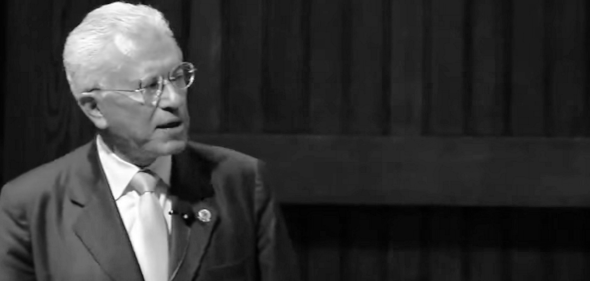roberto unger
[porto velho, rondonia, brasil]
______
intro’d to Roberto via Pat here:
@theplayethic @nickstew_art @monk51295 However, I am inspired by @mangabeiraunger‘s visionary humanism vis-a-vis the machine: youtube.com/watch?v=N8n5ZL…
https://www.youtube.com/watch?v=N8n5ZL5PwiA
no one should have to do work that can be done by a machine.. everything that we have learned how to repeat we can express in a formula/rule/algo.. and everything that we can express in a rule we can embody in a physical contraption/machine..
the point of a machine should be to do for us what we have already learned how to repeat.. so that we can preserve our supreme resource.. time.. for that which we have not yet learned how to repeat..
or that begs to not be repeated.. no?
@nickstew_art
monk51295 @theplayethic the repetition of an action can also be an art. The industrial process has reduced that to the purely mechanical.
in the established forms of econ orgs throughout history.. people have been compelled to act as if they were machines.. in this way the true potential of the machine.. for the liberation of humanity is wasted…
nothing is more powerful than this combo of the person and the machine..
the person always one step ahead of the machine.. into the unknown.. the not yet repeatable.
but is it practical.. emerging.. a new form of production.. not simply by accumulation of capital/tech/knowledge.. but also by set of adv experimental practices.. attenuates the contrast between supervision and execution.. so the plan of production is revised in process of being implemented.. it relativizes all work roles.. transforms productive activity into practice of permanent innovation/revolution.. sets stage of this higher relation of person to machine..
2 objections:
1\ would destroy jobs – truth is.. in principle.. as it destroys some jobs it can create many others.. depends on form of econ org.. characteristics: a)market econ not pinned down to single version of self.. experiment w alt ways of org ingn decentralized econ initiatives and reconciling with econs of scale.. come to co exist experimentally w/in same econ..
or not at all
b) econ dependent wage labor no longer predominant form.. higher relation of man to machine will give way … w/ self employment and coops..
2\ preponderance of humanity has not been formed/educated to have relationshp to machine.. requires a revolution in education.. not enough that ed to problem solving but coop in teaching/learning.. necessary that education be taught diolectually.. from at least 2 contrasting pts of view.. so that all of activity can be devoted to the not yet repeatable..
so – rev of everyday life ness – a nother way – living alive.. in perpetual beta.. ness
7 min – underlying project.. is a conception of the mind and ideal existence..
the mind – both a machine and an anti machine..
like machine – modular.. formulated
anti machine – not modular.. not formulaic.. has capacity to combine everything with everything else.. recursive infinity.. enjoys power to achieve insight by transgressing it’s own presuppositions and defying its own methods.. in this respect.. mind is called the imagination..
turn practical of world into tangible embodiment of imagination..
10 min – the mummy to die many deaths to come into full possession of life
when no one has to do work that can be done machine.. closer to what achieving what we all desire.. to die only once..
______
find/follow Roberto:
Roberto Mangabeira Unger (born 24 March 1947) is a philosopher and politician. His work is seen to offer a vision of humanity and a program to empower individuals and change institutions. He has developed his views and positions across many fields, including social, political, and economic theory. In legal theory, he is best known by his work in the 1970s/80s while at Harvard Law School as part of the Critical Legal Studiesmovement, which is held to have helped disrupt the methodological consensus in American law schools. His political activity helped bring about democracy in Brazil, and culminated with his appointment as the Brazilian Minister of Strategic Affairs in 2007 and again in 2015.
Unger was educated in Brazil and the United States. He studied law at the Federal University of Rio de Janeiroand was awarded a research doctorate by Harvard after he had already been teaching there for several years.
At the core of his philosophy is a view of humanity as greater than the contexts in which it is placed. He sees each individual possessed of the capability to rise to a greater life. At the root of his social thought is the conviction that the world is made and imagined. His work begins from the premise that no natural social, political, or economic arrangements underlie individual or social activity. Property rights, liberal democracy, wage labor — for Unger, these are all historical artifacts that have no necessary relation to the goals of free and prosperous human activity. For Unger, the market, the state, and human social organization should not be set in predetermined institutional arrangements, but need to be left open to experimentation and revision according to what works for the project of individual and collective empowerment.Doing so, he holds, will enable human liberation.
Unger has long been active in Brazilian opposition politics. He was one of the founding members of the Brazilian Democratic Movement Party and drafted its manifesto. He directed the presidential campaigns of Leonel Brizola and Ciro Gomes, ran for the Chamber of Deputies, and twice launched exploratory bids for the Brazilian presidency. He served as the Minister of Strategic Affairs in the second Luiz Inácio Lula da Silva administration and the beginning of the second Dilma administration. Unger is also the subject of the feature documentary Visions for the Future directed by Robert Rippberger chronicling his work in Brazil in the Amazonian state of Rondônia putting theory into practice.




















